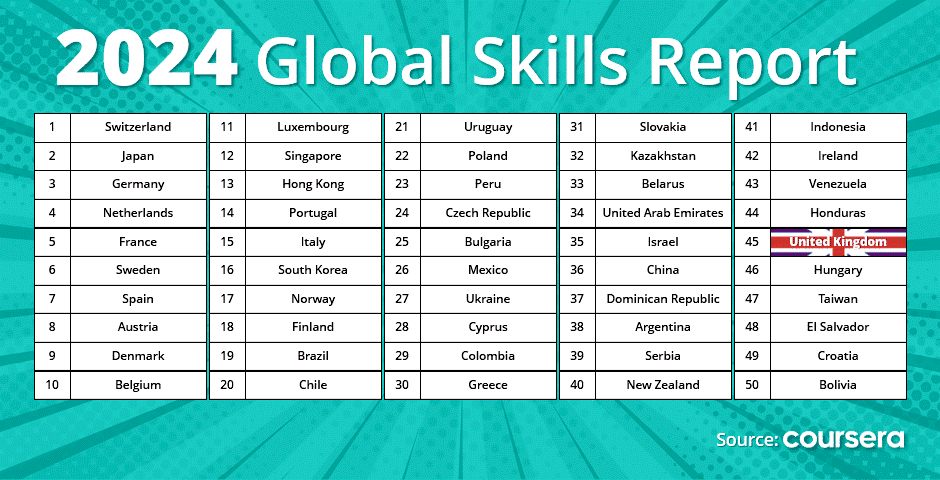Menu

UK Rises in Global Skills Rankings, But is the Work Just Beginning?
The UK’s climb to 22nd place in the 2025 Coursera Global Skills Report marks a significant improvement in our national skills proficiency – a huge leap from 45th position a year ago!
For HR professionals and business leaders alike, this is both welcome news and a reminder of the urgent, ongoing work required to future-proof our workforce.
Drawing on data from over 170 million learners across 100+ countries, Coursera’s annual report provides a unique lens into how individuals are developing skills through the platform’s 350+ university and industry partners. While the UK’s improved ranking now places them ahead of leading economies such as the USA and China, it also reveals how dynamic the global skills landscape is, and how quickly others are adapting.
One of the most striking trends shaping this evolution is the explosion in demand for advanced digital capabilities. According to the World Economic Forum’s Future of Jobs Report 2025, the UK has seen a 319% increase in roles for Big Data Specialists and a 151% rise in demand for AI and Machine Learning Specialists in the past year alone. Meanwhile, 85% of UK employers anticipate becoming fully AI-driven by 2028, with 75% predicting that generative AI (GenAI) will significantly reshape their operations within five years.
This shift is already impacting recruitment, L&D strategies, and long-term workforce planning. Organizations are seeking agile, tech-savvy talent who can adapt quickly and embrace new tools, but this requires not only upskilling current employees but also a strategic re-evaluation of how to attract and grow future talent.
OrgShakers’ Founder and CEO David Fairhurst, who is a former Commissioner for the UK Commission for Employment and Skills, welcomes the UK’s upward movement in the global rankings. Reflecting on his time appointed by the government from 2011 to 2015, he commented:
“This progress is a testament to the incredible resilience and adaptability of the UK workforce. During my time as Commissioner, we consistently emphasised the importance of aligning skills development with the future needs of the economy. It’s encouraging to see that message starting to bear fruit. But now is the time to accelerate, not ease off. If we want to lead in the age of AI, we must continue investing in people, technology, and inclusive access to lifelong learning.”
David’s insight echoes what many HR leaders are recognising: the skills transformation journey isn’t just about catching up, it’s about staying ahead. The rapid advancement of GenAI and emerging technologies means the bar is constantly rising. As AI reshapes roles, we need to think beyond technical skills and foster adaptive thinking, collaboration, and ethical decision-making.
At a time when productivity growth and global competitiveness are under scrutiny, skills development isn’t just an HR issue – it’s a national imperative. The good news? We’ve proven that with focus and commitment, progress is very much possible!
The challenge now is to sustain this momentum and ensure no one gets left behind.



